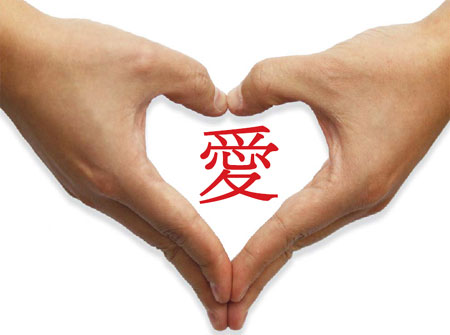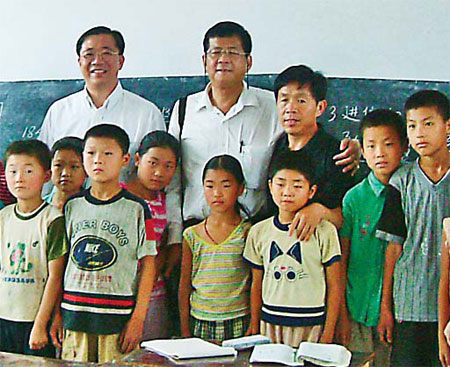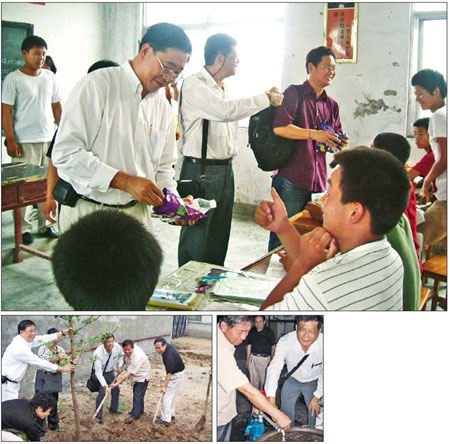Touching hearts
Updated: 2012-02-12 07:56
By Tiffany Tan (China Daily)
|
|||||||||||
|
Wee Lin (back row, second from left) believes in the mantra, Love all, serve all and practices philanthropy based on this. [Provided to China Daily] |
It's all about love. Love for humanity, love for those who are disadvantaged, and having love enough to spare time, money and effort to reach out. With Valentine's Day just round the corner, we highlight some of those who decided that love needed action. Tiffany Tan focuses on a hero of philanthropy with a very different approach.
On an overcast spring day in 2005, Wee Lin finally accomplished the mission he had been planning for half a year. Together with some Chinese friends and fellow Singaporeans, he delivered 100,000 yuan ($15,900) worth of hearing aids to a school for the deaf in Luyi county, Henan province. Inside white classrooms, some with faded walls and peeling paint, Wee distributed 300 hearing aids to boys and girls seated behind wooden desks. The gadgets had been shipped all the way from India. "After he gave the hearing aid to one student, he began chatting with her. This was the first time the girl heard someone's voice and she just stared at him," says Zheng Meng, an event manager under the China Soong Ching Ling Foundation. She had helped Wee organize the donation.
"At the time, tears just started falling from my eyes," she says. "Everyone around us started crying."
Before he left, Wee also gave the school an electric water pump, a hot water radiator, some laptops and fruit trees.
Fast-forward seven years and Wee - named a "hero of philanthropy" by Forbes magazine in 2008 - is planning another project in China.
He wants to sponsor a love-story writing contest in Beijing and publish a book of the winning entries. Reading this, he hopes, will tickle the romantic bones and trigger the pheromones in young urbanites.
"I want them to see beauty in love, feel beauty in love and live beauty in love," says Wee, 65, in a phone interview from his home in Singapore.
To sweeten the challenge, he is offering 15,000 yuan ($2,383) to the winning writer and 5,000 yuan to the finalists.
Three decades since he first got involved in philanthropic work, this father of two grown sons shows no signs of slowing down.
In 1980, he was inspired by a book on the Indian guru Sathya Sai Baba, who preached the mantra "Love all, serve all". Wee began visiting Singapore charity homes every Sunday, and also became vegetarian.
Seven years later, he and several friends established Sunlove, a Singapore home for the mentally ill who had been abandoned by their families. When the waiting list for Sunlove reached 150, Wee opened the larger Surya Home to accommodate these patients.
|
Top: Wee Lin leads a team of donors and brings the gift of hearing to a school for the deaf in Luyi county, Henan province. Far left: To commemorate the occasion, they also leave another gift - several fruit trees for the school. Left: Another practical donation was a water pump so the children and teachers could enjoy potable water. [Photos Provided to China Daily] |
Last year, after northern Japan was devastated by an earthquake and tsunami, he sent 500 self-charging flashlights to the disaster victims. He has also extended aid to India, Indonesia, Myanmar, Pakistan, the Philippines and Sri Lanka.
Wee, a descendant of a mid-19th century shipping tycoon from Fujian province, emphasizes that he is not a "big bucks" philanthropist. He holds a day job as an engineering consultant, and his net worth of 3.5 million Singapore dollars (17 million yuan) largely comes from family inheritance.
But what is immediately apparent upon meeting him is how closely involved he is in his charities. He repeatedly makes long-distance calls to partners to follow up on plans, invites friends to view Facebook pages featuring his projects and personally e-mails them photographs of his latest activities.
"We cannot save the world," he says, elaborating on his personal guideline to philanthropy. "I always go for the multiplier effect."
This, in one sense, means spreading goodwill that will inspire people to pay it forward. In another, getting others to rally behind the same cause.
To the dispossessed that he champions, the "multiplier effect" means giving them the tools to improve their lives.
Since 1995, he has donated much to the Democratic People's Republic of Korea. His main targets are the farmers, supplying them numerous items such as rice, maize, peanuts, vegetable seeds, apple saplings, tilapia fish fingerlings and cattle.
He has also sent disposable syringes and ambulances to the impoverished nation.
"We are in the business of addressing needs and would rather donate something practical that will help people get back on their feet and perhaps make a living out of it," he had said in a newspaper interview in 2007, after purchasing a 100,000-yuan solar-and-wind-powered turbine system for a kindergarten in Pyongyang.
And he has not been deterred by the fact that the country faces political and economic sanctions over its nuclear program.
"Whatever the politics, it does not bother me," says Wee. "I want to help the ordinary people who are having a hard time surviving."
Livelihood. That is the keyword in Wee Lin's lexicon.
It is also the driver behind another of his projects in Beijing. Two years ago, Wee commissioned a replica of the bronze dog head that was looted from the Old Summer Palace in 1860 when French and British troops ransacked the imperial grounds.
To date, only five of the original 12 zodiac animal sculptures are back on the Chinese mainland.
"Why spend millions of dollars recovering the originals," Wee ponders. "If you make something new, you're giving employment to the people who make it."
For one sculptor in Henan province, at least, Wee's replica means an additional income of 28,000 yuan.
And for Wee, it means another act of service accomplished.
You can contact the writer at tiffany@chinadaily.com.cn.

Today's Top News
President Xi confident in recovery from quake
H7N9 update: 104 cases, 21 deaths
Telecom workers restore links
Coal mine blast kills 18 in Jilin
Intl scholarship puts China on the map
More bird flu patients discharged
Gold loses sheen, but still a safe bet
US 'turns blind eye to human rights'
Hot Topics
Lunar probe , China growth forecasts, Emission rules get tougher, China seen through 'colored lens', International board,
Editor's Picks

|

|

|

|

|

|







